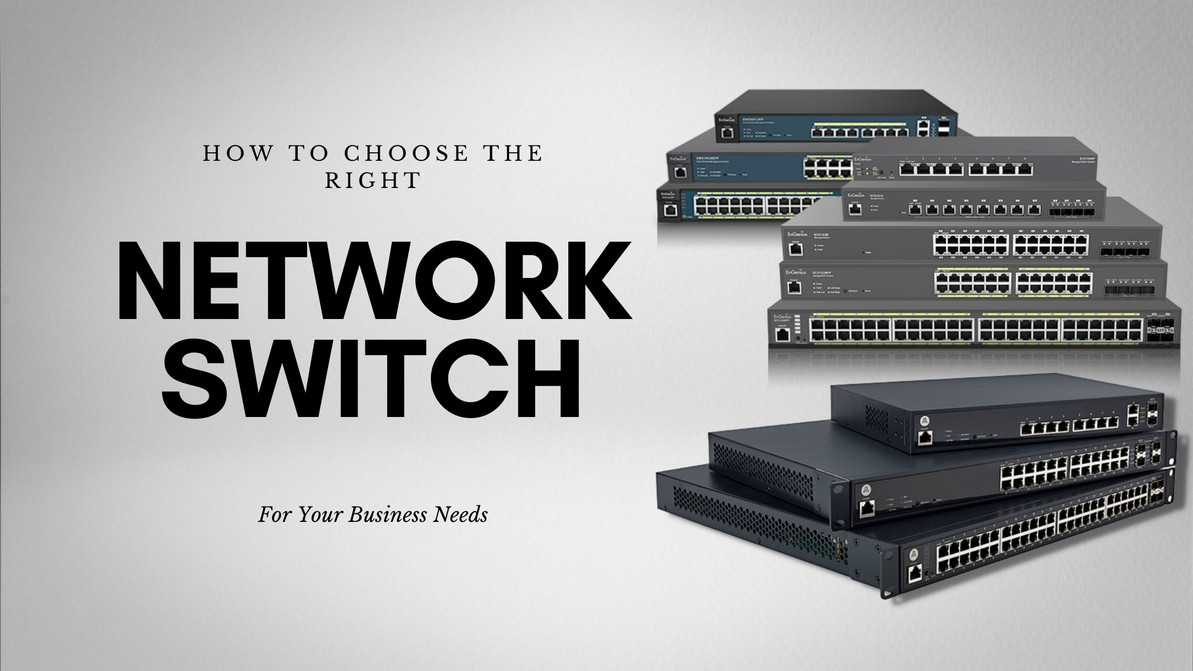How To Choose The Right Network Switch for Your Business Needs
Network switches note or process the media access address (MAC) of devices connected to it. Devices have a code in their network interface card (NIC) that connects to an ethernet cable that then attaches to the network switch.
The network switch uses MAC to identify where connected device outgoing packets are being sent from and where incoming packets are delivered.
You need to understand the types of network switches to help you decide which one is right for the ever-changing requirements of your business.
Types of Network Switches
Here are the different types of network switches and their benefits:
Modular Switches
This type of network switch allows you to add expansion modules as needed, which gives you flexibility as network requirements for your business change.
You can use expansion modules that are application-specific including firewalls, wireless connectivity, or network analysis.
Modular switches also allow additional interfaces, power supplies, or cooling fans. This type of network switch provides the most flexibility, but of course, this level of flexibility comes with a hefty price.
Fixed-Configuration Switches
As the name suggests, this type of network switch provides a fixed number of ports. Fixed-configuration switches are not expandable. However, it is much more affordable than modular switches.
Unmanaged switches
An unmanaged switch is a type of fixed-configuration switch that is typically used for providing basic connectivity.
Unmanaged switches require no configuration and are designed to be plug-and-play. If you only need basic switching and connectivity, then unmanaged network switches will do nicely.
This type of network switch works best in a setting that only needs a few ports such as a desk, a conference room, or in a lab.
Smart switches
A smart switch is another type of fixed-configuration switch. This type of network switch offers cost-effectivity since it offers some management and segmentation, quality of service, and security capabilities.
Smart switches are a more affordable alternative to modular switches. However, they are still not as scalable as managed switches.
Smart switches work best at the edge of a large network, as the infrastructure for smaller networks, or low complexity networks.
Managed switches
A managed switch is another type of fixed-configuration switch. This type of network switch offers the most comprehensive set of features to provide the best application experience. It also offers the highest levels of security, precise control and management of the network, and the greatest scalability.
Managed switches are best suitable to function as aggregation or access switches in large networks or as core switches in smaller networks.
Managed switches are the most expensive network switch under fixed-configuration switches. This type of network switch is most common in organizations with large or growing networks.
Important Network Switch Features
Aside from evaluating the types of switches available, you should also consider network switch features such as speeds, number of ports, power-over-Ethernet features, and stacking capabilities.
Switch speeds
Aside from their categories, network switches are also available in different throughputs or speeds. Throughput or speed refers to the rate the switch transmits data in megabits per second (Mbps).
The network switch speed you need depends on the type of throughput you are expecting. For instance, you need to move or share large data files regularly, you should consider a Gigabit Ethernet switch.
Number of ports
The number of ports in your network switch matters, so you need to keep it in mind when making a decision. Modular switches are flexible which means you can modify them as needed. However, fixed-configuration switches come with a fixed number of ports. Fixed-configuration switches are available in five, eight, 10, 16, 24, 28, 48, or 52 ports.
The bigger your business is and the more network users you have, the more ports you'll need.
Power over Ethernet (PoE) or non-PoE
Power over Ethernet allows you to power devices such as an IP phone, surveillance camera, or wireless access point with the use of the cable that is used for data traffic.
PoE lets you place endpoints anywhere, including those areas that are usually difficult to reach. Network switches with PoE are more expensive.
Keep this factor in mind when deciding on what type of network switch to get. Determine whether you need PoE in your business network.
Stackable or Standalone Switches
You need to consider your plans of business expansion when deciding on what kind of network switch to get for your company. Your business will grow and your network will need to support more devices and accommodate more users.
Standalone switches are managed and configured as an individual entity with limited capacity. If there is a problem, troubleshooting is also switch-specific.
On the other hand, as the name suggests--- stackable switches allow you to stack to increase the capacity and availability of your network. Instead of configuring, managing, and troubleshooting each switch, stackable switches allow you to treat each stack as a single unit. If any part of the stack fails, the network will keep running.
Bottomline
Network switches can help offload traffic for analytic purposes. They are also important to security since a switch can be placed in front of a WAN router, before the traffic goes to the LAN. Your network switch can facilitate intrusion detection, performance analytics, and firewalling.
Take your time in deciding which network switch is right for your business. Keep the types of switches and their features in mind before making your decision.
Recent Posts
-
Why It's Important to Purchase Genuine HPE Replacement Parts
When maintaining the integrity and performance of your Hewlett Packard Enterprise (HPE) systems, the …Jun 28th 2024 -
Mastering Modern Data: Cutting-Edge Storage Solutions in the AI Era
In the rapidly evolving digital era, Artificial Intelligence (AI) has become a cornerstone of innov …Jun 20th 2024 -
Product Comparison: HPE Q1J00A MSA 2050 vs. HPE Q1J10A D3710 vs. HPE 717870-001 MSA 2040
IntroductionIn today’s data-driven world, the demand for efficient, reliable, and scalable data stor …May 23rd 2024




